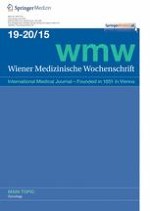Anzeige
01.10.2015 | review
Smoking, inflammation and small cell lung cancer: recent developments
Erschienen in: Wiener Medizinische Wochenschrift | Ausgabe 19-20/2015
Einloggen, um Zugang zu erhaltenSummary
Small cell lung cancer (SCLC) accounts for 15 % of all lung tumors and represents an invasive neuroendocrine malignancy with poor survival rates. This cancer is highly prevalent in smokers and characterized by inactivation of p53 and retinoblastoma. First in vitro expansion of circulating tumor cells (CTCs) of SCLC patients allowed for investigation of the cell biology of tumor dissemination. In the suggested CTC SCLC model, the primary tumor attracts and educates tumor-promoting and immunosuppressive macrophages which in turn arm CTCs to spread and generate distal lesions. Preexisting inflammatory processes associated with chronic obstructive pulmonary disease (COPD) seem to potentiate the subsequent activity of tumor-associated macrophages (TAM). Activation of signal transducer and activator of transcription 3 (STAT3) and expression of chitinase-3-like 1/YKL-40 in SCLC CTCs seems to be associated with drug resistance. In conclusion, inflammation-associated generation of invasive and chemoresistant CTCs most likely explains the characteristic features of SCLC, namely early dissemination and rapid failure of chemotherapy.
